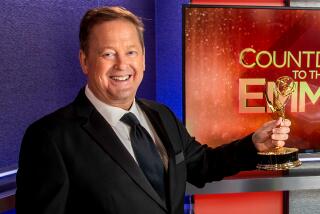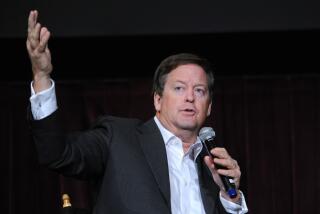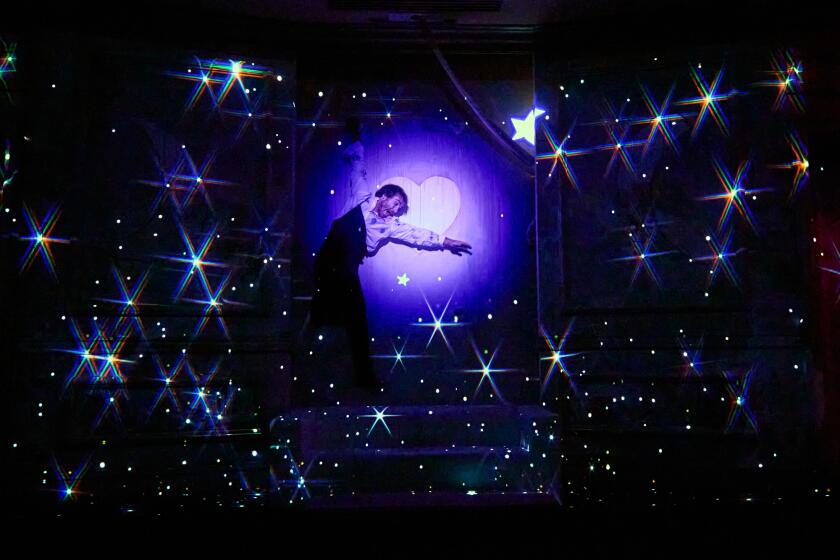‘Carousel’ Trades Complexity for Humor
No, they weren’t meant as stage directions. Still, anyone presenting the Rodgers and Hammerstein musical “Carousel” would do well to keep in mind these words from one of its most beloved songs: “When you walk through a storm, keep your chin up high, and don’t be afraid of the dark.”
At the semi-staged performance of “Carousel” at the Hollywood Bowl Sunday night, director Arthur Allan Seidelman and one of his big-name actors got scared of the dark. Shying from the complexity of this troubling yet hope-filled musical, they made the unfortunate choice of playing its comedy too broadly or inserting it where it didn’t belong.
The result marred what was, in almost every other respect, an exemplary staging, with John Mauceri and the Hollywood Bowl Orchestra performing the show’s lush but rarely used original orchestrations and an all-star cast delivering brave, gorgeously sung characterizations.
The one-night-only event delivered Richard Rodgers and Oscar Hammerstein II’s second great collaboration in almost its entirety--songs, dialogue, dances and all. Functionally costumed and painstakingly rehearsed, the singer-actors worked without scripts, occupying the front of the stage while the orchestra and the Mitch Hanlon Singers lent rich support in the background.
Seidelman has contributed solid semi-staged versions of such classics as “The Boys From Syracuse” to the local Reprise! series, and for the most part, he showed keen insight into the deeply flawed and almost frighteningly true-to-life characters of “Carousel,” who do things against their better judgment, hurting themselves and the ones they love.
The central character, Billy Bigelow, is particularly unsettling. Yet in a revelatory performance by local opera favorite Rodney Gilfry, this loutish carousel barker found yearning expression.
Blond, buff and handsome, with a smooth-as-silk baritone, Gilfry left no doubt as to why women in an 1870s New England town queue at his carousel just to get a look at him. Completing the picture, Gilfry--who two months ago played a very different Billy in L.A. Opera’s “Billy Budd”--shaded his songs and dialogue with the frustration, regret and strangled love of a man who keeps reaching out to caress, but ends up slapping instead.
As his beloved, Julie Jordan, rising Broadway star Alice Ripley (“Side Show” and here, taking a night off from the Ahmanson’s presentation of “James Joyce’s The Dead”) found subtle ways to indicate how this radiant young woman tolerates his abuse. Standing her ground every time he raised his voice or hand, she dared him to be a better man.
For the extended ballet that allows the deceased Billy to see how his daughter is faring back on Earth, Daniel Pelzig brought the stage alive with images from the New England town, from the carousel (male dancers lifting female partners whose arms were gracefully frozen like galloping horses) to townspeople whirling around unfortunate young Louise (Brenda Matthews) in a taunting waltz of happiness.
The interpretational problem came in the portrayal of Julie’s friend Carrie Pipperidge. Whether called for or not, Faith Prince (1992 Tony winner for “Guys and Dolls” and also taking a night off from “The Dead”) played every scene for laughs. This proved especially ill-suited to Carrie’s encounter with no-good Jigger Craigin (Raymond Jaramillo McLeod). As he made his moves on her, Prince coyly responded in the affirmative--squealing, sashaying and even stretching out provocatively. Viewers tittered, just when their picnic-stuffed stomachs should have been turning in horror.
Prince and Seidelman needed to trust that the world would right itself again when earth mother Nettie Fowler (Judy Kaye, of the Los Angeles and Broadway productions of “Ragtime”) delivered her dusky rendition of “You’ll Never Walk Alone,” bestowing the show’s themes of resilience and hope.
More to Read
The biggest entertainment stories
Get our big stories about Hollywood, film, television, music, arts, culture and more right in your inbox as soon as they publish.
You may occasionally receive promotional content from the Los Angeles Times.







